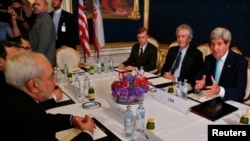U.S. Secretary of State John Kerry and three European foreign ministers failed to achieve a breakthrough in nuclear talks with Iran’s foreign minister Sunday in Vienna. Working-level talks will continue, but the two sides remain far apart on central issues.
There was a day-long series of meetings before the key session between Secretary Kerry and Iranian Foreign Minister Mohammed Javad Zarif Sunday night. After nearly two hours, Kerry emerged without comment, providing no update to earlier comments by British Foreign Secretary William Hague.
“There has been no breakthrough in these talks today, but it has been important, I think, for the ministers to come together and discuss the issues. We will leave our officials here to continue this over the coming days.”
Kerry’s message to his Iranian counterpart was believed to be the same as was conveyed by the British, German and French ministers, that Iran must limit its nuclear enrichment in order to convince the international community that it is not trying to build a nuclear bomb.
Minister Zarif has said in interviews, and other senior Iranian officials have repeated, that Iran wants to maintain a significant nuclear program, and that international inspections should be enough to satisfy the world that it is purely peaceful.
That has emerged as the main issue still in dispute, along with how long any restrictions would apply. Before Kerry arrived, a senior U.S. official involved in the talks said some of Iran’s positions are “inadequate and unworkable.” Kerry said there still are “significant gaps.”
Working-level negotiators will continue their talks during the coming week, toward a deadline of next Sunday. But without a breakthrough at the senior level, there is little hope that an accord can be finalized. Iran and the six countries representing the United Nations could agree to extend the deadline, but officials will not even talk about that for now.
If the negotiations break down, there will be moves to further tighten international economic sanctions that have crippled the Iranian economy, and Iran likely would forge ahead with its nuclear program. That would increase concerns that it could produce enough nuclear material for a weapon and could trigger military action.
Verifiable controls
The United Nations Security Council deputized its five permanent members - the United States, France, Britain, Russia and China - plus Germany to negotiate with Iran on measures to guarantee that its nuclear program is purely peaceful, as Iran says it is.
But Iran has violated past agreements on the nuclear program, ignored resolutions from the Security Council and the International Atomic Energy Agency, and pursued secret military nuclear research.
So the international community wants strict, verifiable controls to ensure that if Iran does decide to build a nuclear bomb, the project could not be kept secret, and would take a year or more. That would provide time for diplomatic or, potentially, military moves to stop it.
These talks follow a preliminary agreement reached in December that resulted in some rollbacks of Iran’s nuclear program in return for limited relief of economic sanctions. That generated some optimism that a full accord could be reached. But Iran expert Matthew Moran of London’s King’s College says there never was a guarantee.
“Great steps were made with the Joint Plan of Action. But none of the measures agreed they were irreversible. So, these could be reversed and it could fall apart,” said Moran.
The two sides agreed to negotiate a comprehensive agreement within six months, giving themselves a July 20 deadline.
Even if they agree on an extension, they face additional problems. Officials are concerned that momentum toward an agreement could be lost, that international sanctions could weaken and that U.S. congressional elections in November could make it harder to get sanctions relief approved. In addition, Iran has indicated that it wants more easing of sanctions as part of any extension, something U.S. officials say they are not willing to provide.
Last year, it took two interventions by foreign ministers to finalize the preliminary agreement. This is their first visit to these talks, and the Russian and Chinese ministers were unable to get here. So, the ministers could be back again next weekend for a final push.




